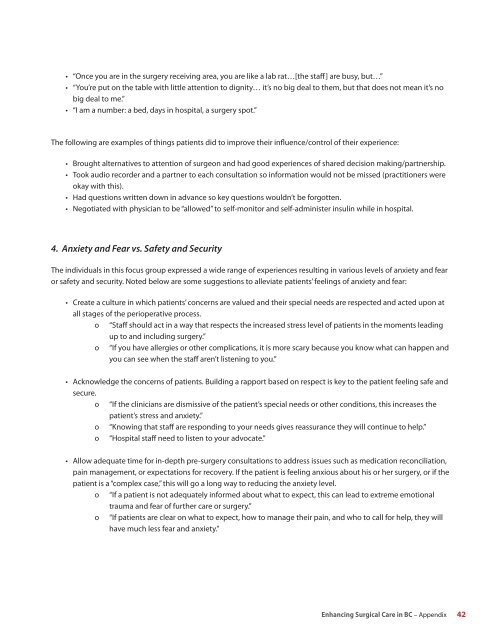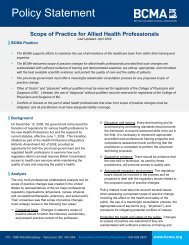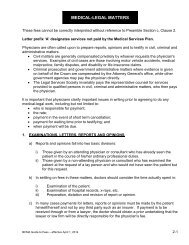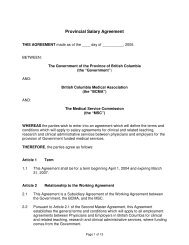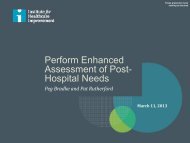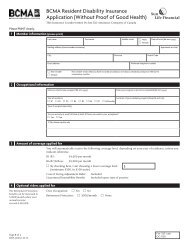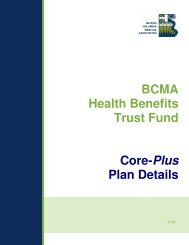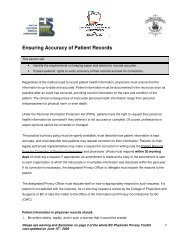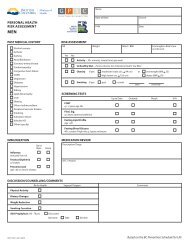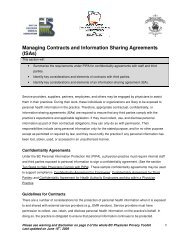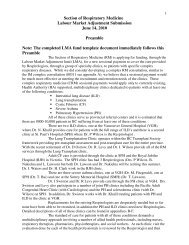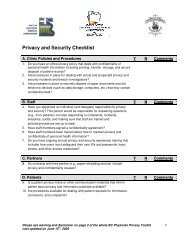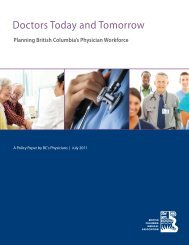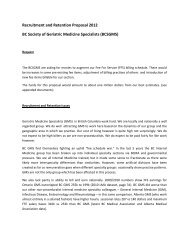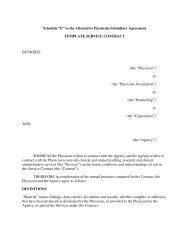Enhancing Surgical Care in BC - British Columbia Medical Association
Enhancing Surgical Care in BC - British Columbia Medical Association
Enhancing Surgical Care in BC - British Columbia Medical Association
You also want an ePaper? Increase the reach of your titles
YUMPU automatically turns print PDFs into web optimized ePapers that Google loves.
• “Once you are <strong>in</strong> the surgery receiv<strong>in</strong>g area, you are like a lab rat…[the staff] are busy, but…”<br />
• “You’re put on the table with little attention to dignity… it’s no big deal to them, but that does not mean it’s no<br />
big deal to me.”<br />
• “I am a number: a bed, days <strong>in</strong> hospital, a surgery spot.”<br />
The follow<strong>in</strong>g are examples of th<strong>in</strong>gs patients did to improve their <strong>in</strong>fluence/control of their experience:<br />
• Brought alternatives to attention of surgeon and had good experiences of shared decision mak<strong>in</strong>g/partnership.<br />
• Took audio recorder and a partner to each consultation so <strong>in</strong>formation would not be missed (practitioners were<br />
okay with this).<br />
• Had questions written down <strong>in</strong> advance so key questions wouldn’t be forgotten.<br />
• Negotiated with physician to be “allowed” to self-monitor and self-adm<strong>in</strong>ister <strong>in</strong>sul<strong>in</strong> while <strong>in</strong> hospital.<br />
4. Anxiety and Fear vs. Safety and Security<br />
The <strong>in</strong>dividuals <strong>in</strong> this focus group expressed a wide range of experiences result<strong>in</strong>g <strong>in</strong> various levels of anxiety and fear<br />
or safety and security. Noted below are some suggestions to alleviate patients’ feel<strong>in</strong>gs of anxiety and fear:<br />
• Create a culture <strong>in</strong> which patients’ concerns are valued and their special needs are respected and acted upon at<br />
all stages of the perioperative process.<br />
o “Staff should act <strong>in</strong> a way that respects the <strong>in</strong>creased stress level of patients <strong>in</strong> the moments lead<strong>in</strong>g<br />
up to and <strong>in</strong>clud<strong>in</strong>g surgery.”<br />
o “If you have allergies or other complications, it is more scary because you know what can happen and<br />
you can see when the staff aren’t listen<strong>in</strong>g to you.”<br />
• Acknowledge the concerns of patients. Build<strong>in</strong>g a rapport based on respect is key to the patient feel<strong>in</strong>g safe and<br />
secure.<br />
o “If the cl<strong>in</strong>icians are dismissive of the patient’s special needs or other conditions, this <strong>in</strong>creases the<br />
patient’s stress and anxiety.”<br />
o “Know<strong>in</strong>g that staff are respond<strong>in</strong>g to your needs gives reassurance they will cont<strong>in</strong>ue to help.”<br />
o “Hospital staff need to listen to your advocate.”<br />
• Allow adequate time for <strong>in</strong>-depth pre-surgery consultations to address issues such as medication reconciliation,<br />
pa<strong>in</strong> management, or expectations for recovery. If the patient is feel<strong>in</strong>g anxious about his or her surgery, or if the<br />
patient is a “complex case,” this will go a long way to reduc<strong>in</strong>g the anxiety level.<br />
o “If a patient is not adequately <strong>in</strong>formed about what to expect, this can lead to extreme emotional<br />
trauma and fear of further care or surgery.”<br />
o “If patients are clear on what to expect, how to manage their pa<strong>in</strong>, and who to call for help, they will<br />
have much less fear and anxiety.”<br />
<strong>Enhanc<strong>in</strong>g</strong> <strong>Surgical</strong> <strong>Care</strong> <strong>in</strong> <strong>BC</strong> – Appendix 42


